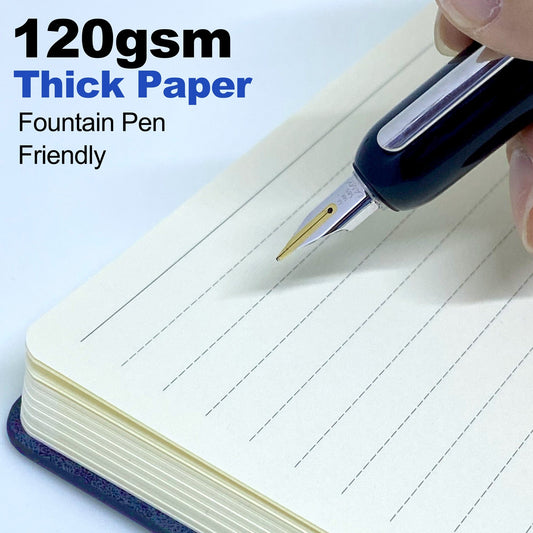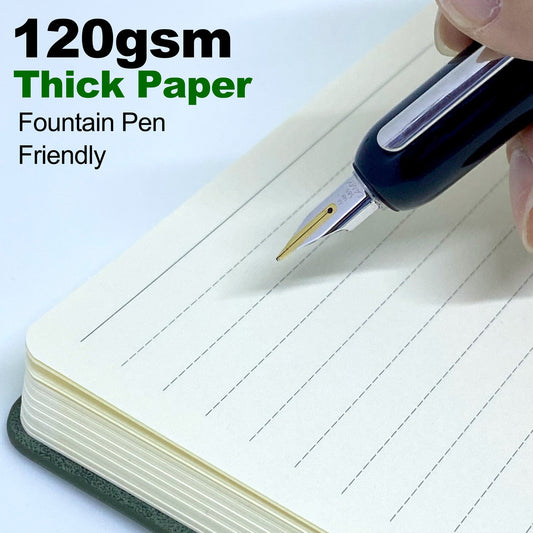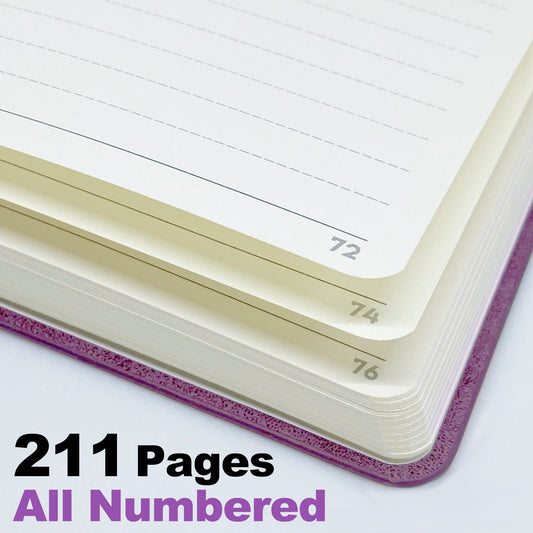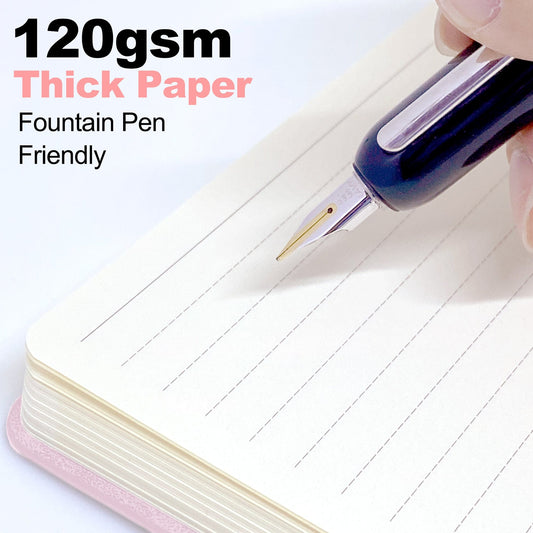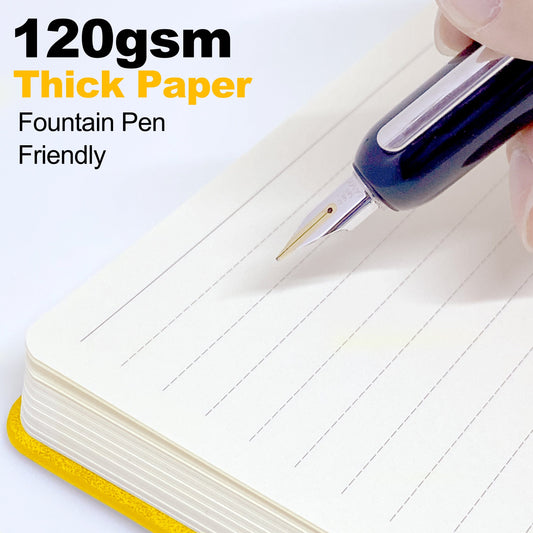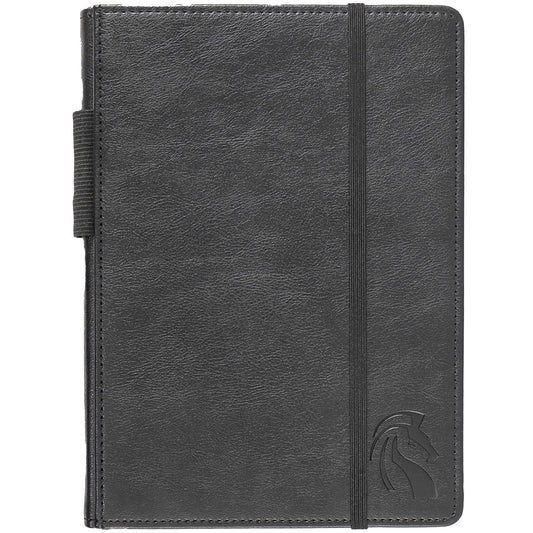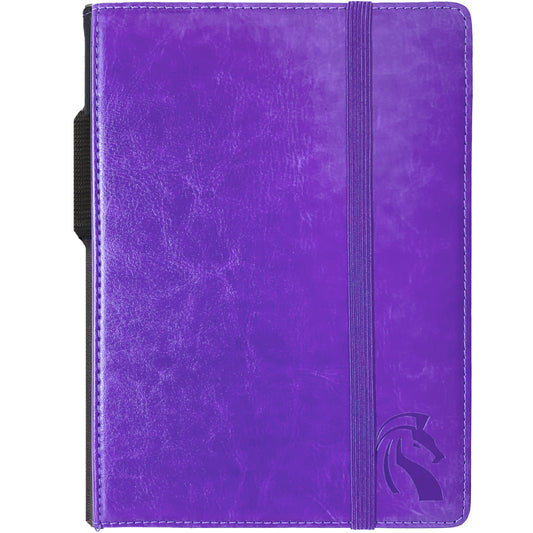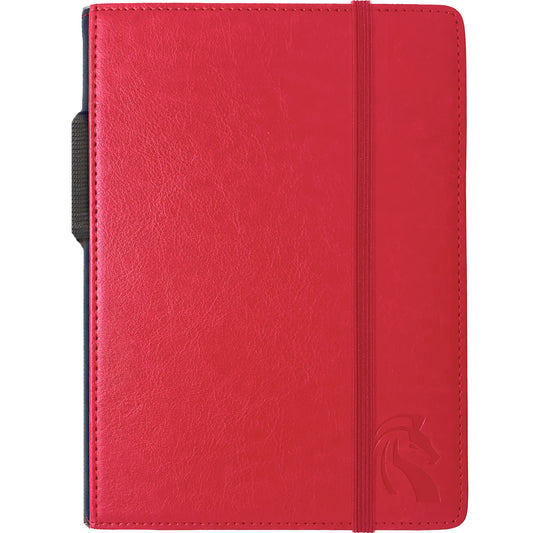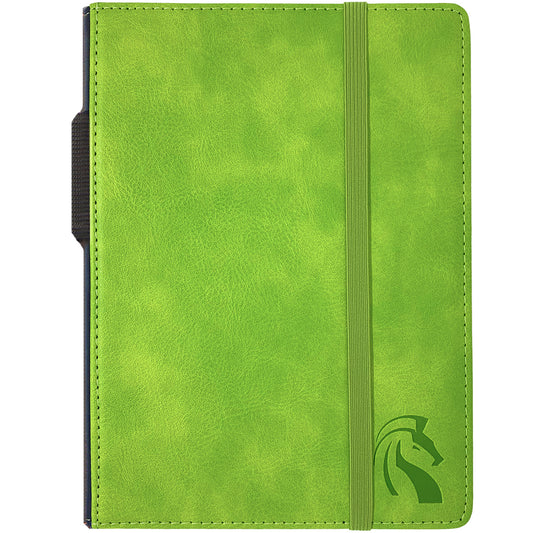Signature Soft Cover Collection
-
ARIEGEOIS | Ashgray Black - A5 Lined Journal Notebook
Regular price $24.95 USDRegular priceUnit price per$30.00 USDSale price $24.95 USDSale -
GARRANO | Cocoa Brown - A5 Lined Journal Notebook
Regular price $24.95 USDRegular priceUnit price per$30.00 USDSale price $24.95 USDSale -
CASPIAN | Royal Red - A5 Lined Journal - Soft Cover
Regular price $24.95 USDRegular priceUnit price per$30.00 USDSale price $24.95 USDSold out -
GALLOWAY | Khaki Cream - A5 Lined Journal Notebook
Regular price $24.95 USDRegular priceUnit price per$30.00 USDSale price $24.95 USDSale -
ROAN | Royal Blue - A5 Lined Journal
Regular price $24.95 USDRegular priceUnit price per$30.00 USDSale price $24.95 USDSale -
JENNET | Juniper Green - A5 Lined Journal Notebook
Regular price $24.95 USDRegular priceUnit price per$30.00 USDSale price $24.95 USDSale -
CHAROLAIS | Grape Purple - A5 Lined Journal Notebook
Regular price $30.00 USDRegular priceUnit price per -
GYPSY | Rosaye Pink - A5 Lined Journal Notebook
Regular price $30.00 USDRegular priceUnit price per -
AKHALTEKE | Ochre Yellow - A5 Lined Journal Notebook
Regular price $30.00 USDRegular priceUnit price per -
HENSON | Desert Brown - A5 Lined Journal Notebook
Regular price $30.00 USDRegular priceUnit price per
Hardcover Series
-
A5 Hardcover Journal Notebook - Black Faux Leather
Regular price $22.95 USDRegular priceUnit price per$25.00 USDSale price $22.95 USDSale -
Classic Brown | Brown Journal Notebook | A5 Hardcover Faux Leather
Regular price $22.95 USDRegular priceUnit price per$25.00 USDSale price $22.95 USDSale -
Proactive Purple | Purple Journal Notebook | A5 Hardcover Faux Leather
Regular price $19.95 USDRegular priceUnit price per$25.00 USDSale price $19.95 USDSold out -
Visionary Red | Red Journal Notebook | A5 Hardcover Faux Leather
Regular price $19.95 USDRegular priceUnit price per$25.00 USDSale price $19.95 USDSale -
Optimist Orange | Orange Journal Notebook | A5 Hardcover Faux Leather
Regular price $25.00 USDRegular priceUnit price per -
Clarity Blue | Light Baby Blue Journal Notebook | A5 Hardcover Faux Leather
Regular price $19.95 USDRegular priceUnit price per$25.00 USDSale price $19.95 USDSale -
Growthful Green | Green Journal Notebook | A5 Hardcover Faux Leather
Regular price $25.00 USDRegular priceUnit price per -
Passionate Pink | Pink Journal Notebook | A5 Hardcover Faux Leather
Regular price $19.95 USDRegular priceUnit price per$25.00 USDSale price $19.95 USDSold out -
Ambition Yellow | Yellow Journal Notebook | A5 Hardcover Faux Leather
Regular price $25.00 USDRegular priceUnit price per
How a Journal Notebook Can Support Mental Health
Mental health is an essential part of overall well-being, and many people are turning to journaling as a tool for managing stress, anxiety, and other emotional challenges. Using a journal notebook for mental health offers a safe space to process thoughts, feelings, and experiences. The simple act of writing allows for self-reflection and emotional release, providing clarity and perspective.
In today's fast-paced world, it’s easy to feel overwhelmed by stress or trapped in negative thinking patterns. A journal can help slow down your thoughts, offering a space to unpack emotions and confront challenges. Journaling has been widely recommended by therapists and mental health professionals as a therapeutic practice, contributing to both emotional well-being and mindfulness.
Why Journaling is Beneficial for Mental Health
Writing in a journal notebook is more than just a form of self-expression—it’s a tool for managing and improving mental health. Journaling helps clarify thoughts and emotions, providing an outlet for those difficult or overwhelming feelings that may be hard to articulate. It can also serve as a record of your emotional growth, allowing you to track patterns in your thinking and behavior over time.
1. Emotional Release
One of the main benefits of journaling is emotional release. Many people bottle up their emotions, leading to increased anxiety or stress. By writing down your thoughts, you release the emotional tension building up inside, allowing you to process your feelings more effectively. This release provides a sense of relief and can help in gaining clarity about the root cause of your emotions.
2. Stress Management
For those dealing with high levels of stress, journaling offers a way to reflect on stressful situations and gain insight into why they’re causing discomfort. By writing about the day’s events or chronic stressors, you may uncover underlying reasons for your stress. Additionally, seeing problems laid out on paper can make them seem more manageable, helping to reduce anxiety.
3. Mindfulness and Grounding
Mindfulness is the practice of being fully present in the moment, and a journal notebook is a powerful tool for cultivating this habit. Writing down your thoughts forces you to focus on what you’re feeling in the present, rather than getting lost in worry about the past or future. This practice helps ground you and provides a mindful way to process emotions and experiences.
What to Look for in a Journal Notebook for Mental Health
Choosing the right journal notebook for your mental health journey is important. While any notebook can serve as a journal, certain features can enhance your journaling experience. Here’s what to consider when selecting a journal for mental health purposes:
1. Paper Quality
Good quality paper is essential for an enjoyable writing experience. Thicker paper ensures that the ink from your pen won’t bleed through, keeping your entries neat and legible. Smooth paper also makes the writing process feel more fluid, reducing any resistance as you jot down your thoughts. This is especially important if you plan to write frequently or use various types of pens.
2. Durable Binding and Cover
Mental health journaling can be a daily or weekly practice, so having a journal that’s durable is crucial. Look for journals with sturdy bindings that can withstand frequent use. Additionally, a durable cover—whether hardback or soft—helps protect your journal from damage, ensuring it lasts as long as you need it.
3. Portability
For those who like to carry their journal notebook with them throughout the day, portability is key. A compact journal that fits in your bag or backpack ensures you have a space to write whenever emotions arise, whether you're commuting, traveling, or simply need a moment of reflection during your day.
Why LeStallion Journals Are Ideal for Mental Health
LeStallion journals are designed with quality and functionality in mind, making them a perfect choice for anyone using a journal notebook for mental health. Their high-quality paper ensures that your writing is smooth, while the thick pages prevent ink bleed-through, even if you use gel or fountain pens. This makes the writing process feel comfortable and seamless, encouraging frequent journaling.
Additionally, LeStallion journals feature durable bindings and covers that protect your entries, making them ideal for long-term use. Whether you prefer a classic leather-bound design or a sleek, minimalist cover, LeStallion offers a variety of styles to suit your taste. The journals’ portability allows you to take them with you, ensuring that you have a reliable outlet for your thoughts whenever needed.
How to Use a Journal Notebook for Mental Health
Journaling for mental health can take many forms. Whether you’re using your journal notebook to process emotions, manage stress, or practice gratitude, having a structured approach to journaling can make it more effective. Here are a few ways to use your journal to improve mental health:
1. Daily Reflection
One of the simplest ways to use a journal for mental health is through daily reflection. At the end of each day, spend a few minutes writing about your experiences, thoughts, and emotions. Reflect on what went well, what challenges you faced, and how you handled them. This type of journaling allows you to process your day and recognize patterns in your thinking and behavior.
2. Gratitude Journaling
Gratitude journaling is a powerful way to shift your mindset toward positivity. Each day, write down three things you’re grateful for, no matter how small. Over time, this practice can help train your brain to focus on the positive aspects of life, which can improve your overall mood and well-being. A journal notebook dedicated to gratitude can be a great tool for boosting happiness and reducing stress.
3. Stream of Consciousness Writing
Sometimes, it’s helpful to let your thoughts flow freely without structure or editing. Stream-of-consciousness writing allows you to write whatever comes to mind without worrying about grammar, punctuation, or making sense. This type of journaling can help you uncover deeper emotions or thoughts you may not have been consciously aware of, providing a valuable outlet for emotional release.
The Therapeutic Value of Writing for Mental Health
Writing has long been considered a therapeutic tool. The act of putting thoughts and feelings into words can offer clarity, reduce mental clutter, and create a sense of control over emotional experiences. A journal notebook dedicated to mental health offers a private, judgment-free space where you can explore your thoughts and work through your emotions.
Writing as Emotional Processing
For many, the simple act of writing down difficult emotions provides relief. When feelings like anxiety, frustration, or sadness are trapped in your mind, they can feel overwhelming. By externalizing them through writing, you create distance between yourself and the emotion, making it easier to process and understand. This process can lead to new insights and help you develop healthier coping mechanisms.
Working Through Negative Thought Patterns
Many mental health challenges stem from negative thinking patterns, such as catastrophizing or self-criticism. A journal notebook allows you to confront these thoughts and challenge them. By writing down negative beliefs, you can begin to analyze them more objectively and identify more realistic, positive alternatives. Over time, this practice helps reshape thought patterns and promotes healthier emotional responses.
How Journaling Can Reduce Anxiety and Promote Calm
Anxiety is a common issue, and journaling has been proven to help manage it. For men and women alike, keeping a journal notebook specifically for anxiety relief can provide an outlet for racing thoughts and help bring a sense of calm. Writing about your worries makes them more tangible, and once you see them on paper, they often appear more manageable.
Grounding Exercises for Anxiety
Grounding exercises in a journal notebook can help reduce anxiety by bringing your focus back to the present moment. One effective method is the “5-4-3-2-1” technique, where you write down:
- 5 things you can see
- 4 things you can touch
- 3 things you can hear
- 2 things you can smell
- 1 thing you can taste
This exercise grounds you in the present moment, helping to alleviate anxiety by shifting focus away from racing thoughts and toward your immediate surroundings.
How to Build a Consistent Journaling Practice for Mental Health
The benefits of journaling for mental health are most effective when practiced consistently. However, starting and maintaining a regular journaling habit can be challenging. Here are some tips to help you stay consistent with your journaling practice:
1. Set Aside Time Each Day
Choose a specific time each day to dedicate to journaling. Whether it’s first thing in the morning, during a lunch break, or before bed, having a consistent journaling time will make it easier to stick with the habit. Start with just 5-10 minutes a day and gradually increase the time as journaling becomes part of your routine.
2. Don’t Worry About Perfection
Your journal is a private space for your thoughts and feelings, so there’s no need for perfection. Don’t worry about spelling, grammar, or structure—just focus on getting your thoughts down on paper. The more relaxed you are about the process, the easier it will be to maintain the habit.
3. Use Journal Prompts
If you’re unsure where to start, using journal prompts can be helpful. Prompts can guide your writing and encourage you to reflect on specific areas of your mental health. Examples of prompts include:
- “What am I feeling right now, and why?”
- “What’s one thing I can do to take care of myself today?”
- “What’s a recent challenge I’ve faced, and how did I handle it?”
Famous People Who Have Used Journaling for Mental Health
Many well-known individuals have embraced journaling as a tool to support their mental health and personal growth. For example, Oprah Winfrey, one of the most influential media personalities, has long advocated for keeping a journal. She has credited journaling with helping her maintain emotional balance and clarity, especially during challenging times. Oprah has shared that writing down her thoughts and reflections has allowed her to cultivate gratitude, which plays a key role in her mental well-being.
Similarly, Emma Watson, the actress and activist, uses journaling as a form of self-care. Watson has spoken publicly about how journaling helps her manage stress, process her emotions, and stay grounded. For her, a journal notebook is a place to reflect on her achievements, challenges, and daily life, providing a mental space for self-reflection and emotional release.
Even Franz Kafka, the famous author, was known to keep extensive diaries in which he worked through his anxieties, fears, and frustrations. Journaling provided Kafka with an outlet for his internal struggles, helping him understand and organize his thoughts. His journals remain a testament to the therapeutic power of writing for mental health.
These examples show how journaling can serve as a valuable mental health tool for anyone, regardless of profession or background. It offers a space to explore emotions, develop self-awareness, and foster a positive mental attitude.
How to Personalize Your Journal for Mental Health
Your journal notebook is a personal space, and customizing it can make the experience even more meaningful. By personalizing your journal, you create a mental health tool that reflects your unique needs and preferences. Here are some ideas for customizing your journal:
1. Add Inspirational Quotes
Incorporate quotes that inspire or motivate you throughout your journal. Whether they are words from famous thinkers, affirmations, or personal mantras, these quotes can provide encouragement when you need it most. Each time you come across a quote in your journal, it serves as a gentle reminder to stay positive and focused on your mental well-being.
2. Create Custom Sections
If you're using your journal for multiple purposes—such as daily reflections, gratitude, goal-setting, and mental health tracking—you can divide your journal into sections. Use sticky notes, dividers, or washi tape to organize your pages. This allows you to have different spaces for various aspects of your mental health journey, making the journal more functional and personalized.
3. Decorate with Artwork or Doodles
If you're artistically inclined, feel free to decorate your journal notebook with sketches, doodles, or even collages. Drawing or adding creative elements can help you express emotions visually when words aren’t enough. Artistic expression in your journal can also make the process of journaling more enjoyable and calming.
Personalizing your journal creates a more intimate connection to it, making it a tool you’re more likely to use regularly.
The Long-Term Benefits of Journaling for Mental Health
Journaling has long-term benefits for mental health that extend beyond immediate emotional relief. Consistent journaling over time can lead to increased self-awareness, emotional resilience, and a stronger sense of purpose. By reflecting on your thoughts and feelings regularly, you begin to recognize patterns, triggers, and areas where personal growth is needed.
1. Tracking Emotional Patterns
Over time, your journal notebook becomes a valuable resource for understanding your emotional patterns. By looking back at past entries, you can identify recurring themes in your thoughts, behaviors, and reactions. This self-awareness allows you to develop coping strategies, address unhealthy habits, and reinforce positive changes.
2. Building Emotional Resilience
Writing about difficult situations helps you process emotions and build emotional resilience. The act of reflecting on challenges—whether they are related to relationships, work, or personal struggles—gives you an opportunity to learn from those experiences. This process enables you to approach future challenges with a greater sense of calm and preparedness, improving your ability to manage stress and adversity.
3. Improving Communication and Relationships
Journaling can also enhance your communication skills. By writing about your thoughts and emotions in a private, safe space, you become more adept at expressing yourself clearly and openly. This improved communication translates into better relationships with others, as you're better equipped to share your feelings, set boundaries, and resolve conflicts.
How to Make the Most of Your Journal Notebook for Mental Health
Making the most of your journal notebook requires commitment and intention. Here are some strategies to ensure you get the full benefits from your journaling practice:
1. Set Clear Intentions
Before you start journaling, set a clear intention for each session. Are you reflecting on your day, working through an emotional challenge, or practicing gratitude? Having a specific focus will help guide your writing and make the practice more meaningful.
2. Stay Consistent
Consistency is key to reaping the long-term benefits of journaling. Aim to write in your journal regularly, whether it’s daily or a few times a week. Set a routine that fits into your lifestyle, and treat your journaling practice as a non-negotiable part of your self-care routine.
3. Don’t Be Afraid to Revisit Past Entries
While journaling is often focused on the present, revisiting past entries can provide valuable insights into your growth. Reflecting on how far you've come—emotionally, mentally, or even professionally—can offer a sense of accomplishment and reinforce your commitment to personal development.
Conclusion: A Journal Notebook for Mental Health Is a Powerful Tool
A journal notebook is a powerful tool for mental health, offering a private space to explore your emotions, manage stress, and cultivate mindfulness. The act of writing helps you process your thoughts, develop emotional resilience, and gain clarity on your mental and emotional well-being.
Whether you're using your journal for daily reflections, gratitude, or emotional release, making journaling a consistent practice can significantly improve your mental health. With the right notebook—like those from LeStallion, which offer high-quality paper, durable covers, and sleek designs—you can create a reliable space for self-reflection and personal growth.
If you’re ready to start your mental health journaling journey, explore the range of LeStallion journals and choose the one that best suits your needs. Start today, and discover the long-term benefits of using a journal notebook for mental health.











